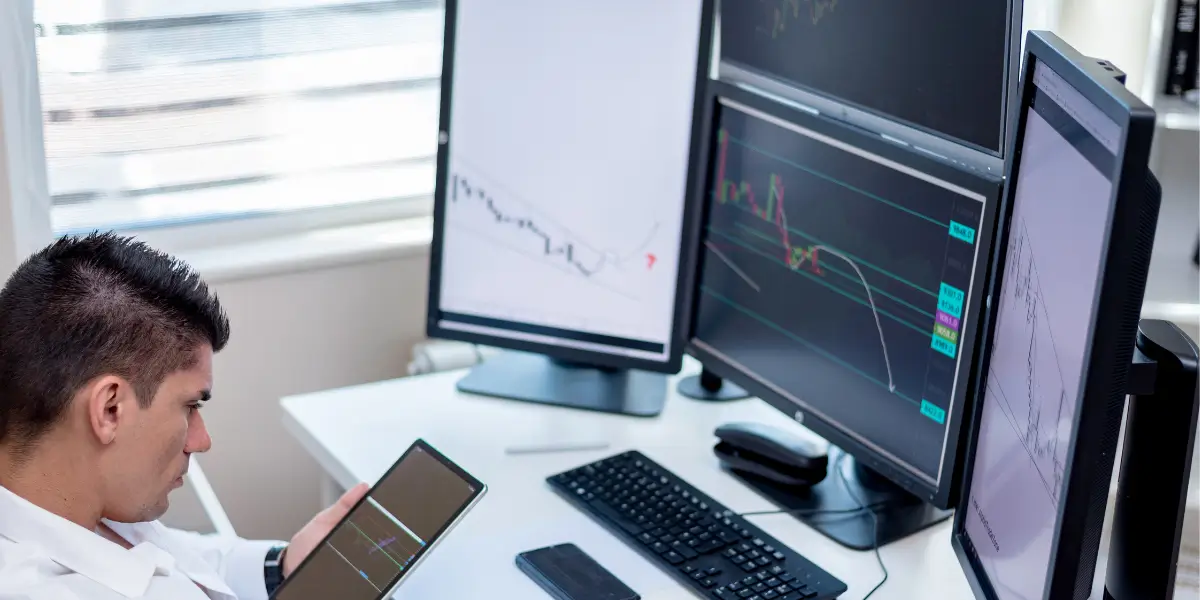Futures trading income potential varies dramatically, but the reality might surprise you. While social media showcases traders claiming $10,000+ monthly profits, the truth about futures trading earnings is more complex and depends on multiple factors including capital, strategy, risk management, and market conditions.
The futures market offers unique opportunities for profit through leverage, allowing traders to control large positions with relatively small amounts of capital. However, this same leverage that amplifies profits also magnifies losses, making futures trading profitability heavily dependent on skill, discipline, and proper risk management.
🚀 TL;DR: How Much Money Can You Make Trading Futures?
Direct Answer: $500 to $50,000+ Monthly (Depends on Your Level)
Futures trading income ranges dramatically based on experience, capital, and approach. Here’s exactly what you can expect:
| Experience Level | Monthly Income Range | Capital Needed | Time to Achieve |
|---|---|---|---|
| Beginner (0-1 year) | $0 – $2,000 | $5,000 – $25,000 | 6-12 months |
| Intermediate (1-3 years) | $2,000 – $8,000 | $25,000 – $100,000 | 1-3 years |
| Advanced (3+ years) | $10,000 – $50,000+ | $100,000+ or Prop Firms | 3-5 years |
💰 Two Main Paths to Futures Trading Income:
🏦 Personal Capital Route:
- Need $50,000-$500,000 for substantial income
- Keep 100% of profits but risk your own money
- Suitable for conservative, well-capitalized traders
🏢 Prop Firm Route (Lower Risk, Faster Scaling):
- Start with $100-$500 evaluation fees
- Access $25,000-$150,000 in trading capital
- Keep 80-90% of profits, firm provides capital
- Scale to $10,000-$50,000+ monthly through multiple accounts
⚡ Quick Reality Check:
✅ What’s Realistic:
- $1,000-$5,000 monthly within first 2 years with proper training
- $10,000+ monthly possible with prop firm scaling or large personal capital
- $500-$2,000 daily achievable for experienced traders
❌ What’s NOT Realistic:
- Immediate massive profits without experience
- 100% win rates or guaranteed income
- Get-rich-quick without risk management
🎯 Fastest Path to $10K+ Monthly (Prop Firm Strategy):
- Master basics with $5,000-$10,000 personal account (3-6 months)
- Pass prop firm evaluations (Phidias offers multiple account types)
- Scale to 5-15 funded accounts through copy trading
- Generate $500-$2,000 per account monthly = $10,000-$30,000 total
💡 Bottom Line:
Futures trading income is absolutely achievable but requires proper education, risk management, and realistic timelines. Most successful traders earn $2,000-$15,000 monthly within 2-3 years through prop firm scaling or moderate personal capital. The key is starting smart, not starting big.
How Much Do Futures Traders Actually Make? (Real Numbers Breakdown)
💰 Beginner Level Income (0-1 Year Experience)
Beginner futures traders typically fall into two categories: those who lose money initially while learning, and those who maintain small profits of $500-2,000 monthly. The learning curve in futures trading is steep, and most new traders focus on preserving capital while developing their skills rather than maximizing profits.
At this stage, risk management and education take priority over aggressive profit targets. We recommend beginners start with our comprehensive futures trading 101 guide and focus on consistency over volume by starting with micro contracts.
📈 Intermediate Level Income (1-3 Years Experience)
Intermediate futures traders often achieve more consistent results, with monthly futures trading income ranging from $2,000-8,000. These traders have developed solid risk management practices and understand market patterns well enough to generate regular profits.
At this stage, many traders begin exploring prop firm opportunities to increase their buying power without risking additional personal capital. This is where scaling strategies become crucial for income growth.
🚀 Advanced Level Income (3+ Years Experience)
Advanced futures traders represent the top tier of futures trading earnings. These professionals often generate $10,000-50,000+ monthly, with some exceptional traders reaching six-figure monthly incomes.
However, these numbers require significant capital, advanced strategies, and years of experience managing both wins and losses. Professional institutional traders can earn hundreds of thousands or millions annually through hedge funds or trading firms. To understand how much professional traders typically earn through prop firms, check out our detailed analysis on prop firm trader earnings.
📊 Income Reality Check
| Experience Level | Monthly Income Range | Success Rate | Key Focus |
|---|---|---|---|
| Beginner (0-1yr) | $0 – $2,000 | 20-30% | Learning & Capital Preservation |
| Intermediate (1-3yr) | $2,000 – $8,000 | 40-60% | Consistency & Scaling |
| Advanced (3+yr) | $10,000 – $50,000+ | 60-80% | Multiple Strategies & Risk Management |
The Mathematics of Futures Trading Profits (Leverage and Position Sizing)
🧮 Understanding Contract Values and Leverage
E-mini S&P 500 futures (ES) serve as an excellent example of futures trading mathematics. Each contract represents $50 per point, meaning a 10-point move generates $500 profit or loss per contract. With futures margin requirements around $12,000-15,000 per contract, traders control $225,000 worth of exposure.
Micro futures contracts provide smaller exposure for beginning traders. Micro E-mini S&P 500 (MES) contracts represent $5 per point, making them ideal for learning futures trading position sizing without excessive risk.
📐 Daily Profit Target Calculations
Conservative daily targets might include 4-6 ES points ($200-300 per contract) through various trading strategies. Scalping approaches target 2-4 points per trade with multiple daily trades, while swing trading aims for larger moves over several days.
Position sizing calculations determine maximum profit potential. Trading 5 ES contracts with a 6-point daily average generates $1,500 daily or approximately $30,000 monthly (assuming 20 trading days). However, this requires substantial capital to manage drawdowns properly.
Capital Requirements: How Much Money Do You Need to Start Trading Futures?
💳 Minimum Capital Requirements
Micro futures contracts offer the lowest barrier to entry. Micro E-mini S&P 500 (MES) requires approximately $1,300 in margin, while Micro Gold (MGC) needs around $825. However, successful futures trading typically requires 3-5 times the minimum margin to handle normal market fluctuations.
Standard futures contracts demand higher capital commitments. E-mini S&P 500 (ES) requires $12,000-15,000 in margin, but experienced traders recommend $25,000-50,000 per contract to trade safely.
🎯 Recommended Starting Amounts
| Contract Type | Minimum Margin | Recommended Capital | Monthly Income Potential |
|---|---|---|---|
| Micro E-mini (MES) | $1,300 | $5,000 – $10,000 | $500 – $2,000 |
| E-mini S&P (ES) | $13,000 | $25,000 – $50,000 | $2,000 – $10,000 |
| Multiple Contracts | Varies | $100,000+ | $10,000+ |
📊 Capital vs Income Relationship
Conservative capital recommendations suggest starting with $10,000-25,000 for micro contracts and $50,000-100,000 for standard contracts. These amounts provide sufficient cushion for learning while maintaining proper risk management in futures trading.
Scaling capital requirements grow with income ambitions. Generating $10,000 monthly typically requires either exceptional skill with smaller accounts or moderate success with larger capital bases.
Prop Firm Futures Trading: Making Money with Less Capital
🏢 How Prop Firms Transform Income Potential
Futures prop firms revolutionize income potential by providing capital access without massive personal investment. Understanding what prop firms are and how they operate is essential for traders looking to scale their income beyond traditional capital limitations.
Prop firm futures trading allows skilled traders to generate substantial income while limiting personal financial risk to evaluation fees. At Phidias Propfirm, we offer multiple account types to suit different trading styles. Fundamental accounts require positions to close daily, while Swing accounts allow overnight and overweek position holding.
🎮 Phidias Propfirm Account Options
Our account structures provide flexibility for different trading approaches:
- 🎯 Fundamental Accounts: Daily position closure, perfect for day traders
- 📈 Swing Accounts: Overnight/overweek holding, ideal for position traders
- ⚡ Static Accounts: Simplified rules with fixed drawdown limits
- 🏆 10K Drawdown Challenge: Competitive monthly challenges with live account prizes
🔄 Copy Trading and Income Scaling
Copy trading in prop firms represents a significant income acceleration strategy. Master traders develop profitable strategies and replicate them across multiple funded accounts. This approach can transform a $2,000 monthly single-account profit into $20,000+ through ten-account scaling.
Prop firm income scaling happens through multiple account management. Experienced prop traders often manage 5-15 accounts simultaneously, creating substantial aggregate income with proper systems.
Scaling Your Futures Trading Income (From $1K to $10K+ Monthly)
📊 The $1K Monthly Foundation
Starting with $1,000 monthly profits often involves single-contract trading with tight risk management. Traders focus on consistency over volume, developing reliable entry and exit signals. Micro contracts provide ideal vehicles for this stage, allowing skill development without excessive capital risk.
Foundation building requires mastering basic risk management, market analysis, and execution discipline before attempting to scale profits higher.
🚀 Breaking Through to $5K Monthly
Growing to $5,000 monthly usually requires either increased position sizes or higher win rates. Traders might graduate from micro to standard contracts or begin managing multiple prop firm accounts. Risk management becomes more critical as position sizes grow and profit targets increase.
Strategy refinement at this level involves optimizing entry timing, improving risk-reward ratios, and developing multiple trading approaches for different market conditions.
💎 Reaching $10K+ Monthly Elite Level
Reaching $10,000+ monthly demands sophisticated approaches. Professional futures traders at this level typically combine multiple strategies: directional trading, spread trading, and arbitrage opportunities. Many also integrate prop firm accounts with personal capital to maximize leverage while limiting risk.
Multiple account management through copy trading systems allows experienced traders to replicate successful strategies across numerous accounts. Technology and automation become essential tools for managing increased complexity.
Can You Trade Futures for a Living? (Full-Time Trading Reality)
💼 Minimum Requirements for Full-Time Trading
Trading futures for a living requires minimum income of $5,000-10,000 monthly to replace average salaries. However, trading income volatility means successful traders often target 2-3 times their minimum needs to handle inevitable drawdown periods.
Capital requirements for living income depend heavily on trading approach. Personal capital traders usually need $100,000-500,000 to generate sustainable living income through conservative strategies.
⏰ Professional Trading Schedule and Lifestyle
Professional trading schedule differs dramatically from employment. Market hours determine trading opportunities, but preparation and analysis extend well beyond active trading time. Many professional futures traders work 6-8 hours daily on market analysis, trade planning, and account management.
Healthcare and retirement planning require special attention for independent traders. Unlike traditional employment, trading income doesn’t provide benefits packages, requiring separate arrangements for insurance and retirement planning.
🧠 Psychological Demands and Support
Psychological demands of full-time trading exceed those of part-time approaches. Income pressure can lead to overtrading, revenge trading, and poor risk management. Mental discipline and emotional control become as important as technical skills.
At Phidias Propfirm, we support full-time prop traders through flexible payout schedules, scaling opportunities, and community support systems. Many of our most successful traders transition from part-time to full-time trading after proving consistent profitability.
Risk Management and Realistic Profit Expectations
🎯 Setting Realistic Monthly Return Targets
Monthly return expectations should reflect capital base and strategy type. Conservative futures trading might target 3-8% monthly returns, while aggressive approaches aim for 15-25%. However, higher return targets typically involve proportionally higher risk levels.
Win rate expectations vary by strategy but typically range from 40-70%. Scalping strategies often achieve higher win rates with smaller average wins, while trend following approaches may win less frequently but with larger average profits.
⚠️ Understanding Drawdowns and Risk
Drawdown management determines long-term trading survival. Maximum drawdown limits typically range from 10-25% of account value, depending on strategy and risk tolerance. Consecutive losing periods are inevitable in futures trading.
Position sizing calculations directly impact both profit potential and risk exposure. Risk per trade commonly ranges from 0.5-2% of account value, with aggressive traders occasionally risking up to 5% on high-confidence setups.
📊 Key Risk Metrics to Track
| Risk Metric | Conservative | Moderate | Aggressive |
|---|---|---|---|
| Risk per Trade | 0.5-1% | 1-2% | 2-5% |
| Max Monthly Drawdown | 5-10% | 10-15% | 15-25% |
| Target Monthly Return | 3-8% | 8-15% | 15-25% |
| Win Rate Target | 60-70% | 50-60% | 40-50% |
Success Stories: Real Futures Traders Making Consistent Income
🏆 Conservative Income Builders
Conservative income builders often start with micro contracts and gradually scale positions as profits accumulate. These traders typically target modest monthly returns (5-15%) but maintain exceptional consistency and low drawdown levels.
Compound growth over multiple years creates substantial wealth accumulation without excessive risk. These traders prioritize capital preservation and steady growth over spectacular short-term gains.
🔥 Prop Firm Success Stories
Prop firm success stories demonstrate income scaling possibilities with limited personal capital. Multi-account traders often generate $20,000-50,000+ monthly by replicating successful strategies across numerous funded accounts.
Copy trading systems enable this scaling while maintaining manageable workload and risk control. At Phidias Propfirm, we observe traders successfully managing 10-20 accounts through systematic approaches.
⚡ Professional Day Traders
Professional day traders achieve substantial income through high-frequency strategies and large position sizes. These traders often focus on liquid markets like E-mini S&P 500 or Euro futures, executing dozens of trades daily.
Technology infrastructure and execution speed become critical success factors for these high-volume trading approaches. Systematic execution removes emotional decision-making while maintaining consistency.
📈 Systematic Trading Specialists
Algorithm-based traders develop quantitative strategies that identify statistical edges and execute trades automatically. Backtesting and forward testing validate strategies before live implementation.
Market-making strategies provide steady income through bid-ask spread capture rather than directional prediction. These approaches require sophisticated technology but offer reduced market exposure.
Common Mistakes That Prevent Futures Trading Profits
❌ The Big Three Profit Killers
Overtrading represents the most common profit destroyer in futures markets. Excessive position sizes, too frequent trading, and chasing markets typically stem from impatience or profit pressure.
Poor risk management includes inadequate position sizing, missing stop losses, and ignoring maximum drawdown limits. Risk per trade exceeding 2-5% of account value creates unsustainable risk levels.
🧠 Psychological Trading Pitfalls
Emotional trading destroys systematic approaches through fear, greed, and revenge trading. Losing streaks trigger desperation trading, while winning streaks encourage overconfidence and increased risk-taking.
Unrealistic expectations about profit timelines and return rates lead to excessive risk-taking and psychological pressure. New traders often expect immediate profitability and linear income growth.
📚 Preparation and Planning Failures
Lack of trading plan results in inconsistent execution and emotional decision-making. Successful traders develop detailed trading plans covering entry criteria, exit strategies, and risk management procedures.
Strategy hopping prevents skill development and statistical validation. New traders often abandon profitable strategies after short-term losses without proper testing or statistical significance.
💰 Capital Management Errors
| Common Mistake | Impact | Solution |
|---|---|---|
| Trading with scared money | Poor decisions under pressure | Use only risk capital |
| Inadequate capital buffer | Margin calls and forced exits | 3-5x minimum margins |
| Unrealistic income dependence | Emotional pressure and overtrading | Maintain separate income source |
Your Action Plan: Starting Your Futures Trading Journey
📚 Phase 1: Education and Preparation (Months 1-3)
Education phase should cover market fundamentals, contract specifications, risk management principles, and basic strategies. Paper trading allows platform familiarity and strategy testing without financial risk.
Strategy selection depends on available time, risk tolerance, and capital base. Day trading strategies require active monitoring but offer quick feedback, while swing trading approaches demand less screen time but involve overnight exposure.
💰 Phase 2: Capital and Platform Setup (Month 3-4)
Capital preparation involves both trading funds and living expenses. Trading capital should represent risk money rather than essential funds. Emergency reserves covering 6-12 months living expenses prevent financial pressure.
Platform selection affects execution quality and strategy implementation. Professional platforms offer advanced charting, order types, and risk management tools that impact trading success.
🎯 Phase 3: Live Trading and Prop Firm Evaluation (Month 4-6)
Prop firm evaluation provides capital access without large personal investment. Explore our available account options which offer multiple account types suitable for different trading styles and experience levels. Learn about proven strategies to successfully pass prop firm challenges and secure funded trading capital.
Risk management implementation starts before first trade execution. Position sizing rules, stop loss procedures, and maximum drawdown limits protect capital during learning phases.
📊 Phase 4: Scaling and Professional Development (Month 6+)
Performance tracking identifies strengths, weaknesses, and improvement areas. Trading journals recording entry reasons and exit criteria provide valuable feedback for strategy refinement.
Scaling timeline should reflect demonstrated competence rather than time elapsed. Consistent profitability over multiple months justifies position size increases or additional account opening.
🚀 Ready to Start Your Futures Trading Journey?
We invite you to explore futures trading opportunities at Phidias Propfirm. Our comprehensive evaluation programs, flexible account types, and supportive trading community provide optimal environments for skill development and income generation.
Professional futures trading begins with single successful step – take yours today. Contact us to learn more about our evaluation programs and join thousands of successful traders building sustainable income through professional futures trading.








